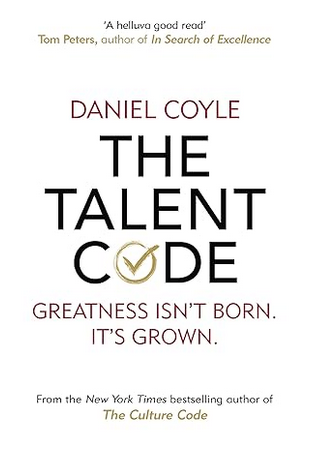Daniel Coyle’s The Talent Code: Greatness Isn’t Born. It’s Grown. Here’s How. is a groundbreaking exploration of how talent is developed, challenging the age-old notion that greatness is solely the result of innate ability. Through a compelling blend of neuroscience, psychology, and real-world examples, Coyle reveals that talent is not a gift bestowed upon a lucky few but a skill that can be cultivated through deliberate practice, deep focus, and the right environment. This book is a must-read for anyone seeking to understand how to unlock their potential or help others achieve greatness.
The Core Idea: Myelin and Skill Development
At the heart of The Talent Code is the concept of myelin, a neural insulator that wraps around nerve fibers and enhances the speed and accuracy of electrical signals in the brain. Coyle explains that every time we practice a skill, our brain responds by adding layers of myelin to the relevant neural circuits. The more we practice, the thicker the myelin becomes, and the more proficient we become at the skill. This process, Coyle argues, is the biological foundation of talent.
Myelin growth is not automatic, however. It requires a specific type of practice—what Coyle calls “deep practice.” This involves struggling through challenges, making mistakes, and correcting them in a focused and intentional way. Deep practice is not about mindless repetition but about pushing the boundaries of one’s abilities, which in turn stimulates myelin production and accelerates skill acquisition.
The Three Key Elements of Talent Development
Coyle identifies three critical components that work together to foster talent: deep practice, ignition, and master coaching.
- Deep Practice
Deep practice is the cornerstone of talent development. It involves breaking down skills into smaller components, practicing them slowly and deliberately, and gradually building up to mastery. Coyle illustrates this concept with vivid examples, such as the story of a Brazilian futsal team that produced some of the world’s best soccer players by practicing in a confined space, forcing players to develop quick reflexes and precise ball control. The key to deep practice is embracing struggle. Coyle emphasizes that mistakes are not failures but essential steps in the learning process. By repeatedly encountering and overcoming challenges, individuals strengthen their neural circuits and build the myelin necessary for high performance. - Ignition
Ignition refers to the motivation and passion that drive individuals to engage in deep practice. Coyle argues that talent hotbeds—places where extraordinary skill development occurs—are often fueled by a powerful sense of purpose or inspiration. This could come from a role model, a compelling story, or a shared cultural belief in the value of hard work. For example, Coyle examines the success of South Korean female golfers, who were inspired by the achievements of Se Ri Pak, a trailblazing golfer who ignited a wave of interest and dedication in the sport. Ignition provides the emotional fuel that sustains individuals through the grueling process of deep practice. - Master Coaching
The final element is master coaching, the art of guiding individuals through the process of skill development. Coyle profiles several exceptional coaches who possess an uncanny ability to identify and nurture talent. These coaches are not authoritarian figures but empathetic mentors who provide targeted feedback, create a supportive environment, and instill a growth mindset in their students. Master coaches understand the importance of tailoring their approach to the individual. They recognize that talent development is not a one-size-fits-all process and that each learner requires a unique combination of challenge and encouragement.
Real-World Applications
The Talent Code is not just a theoretical exploration; it offers practical insights for educators, coaches, parents, and anyone seeking to improve their skills. Coyle’s research suggests that talent is not confined to a select few but is accessible to anyone willing to put in the effort and adopt the right strategies.
For educators, this means creating environments that encourage deep practice and provide students with the motivation to persevere. For coaches, it means focusing on deliberate, skill-building exercises rather than simply drilling fundamentals. And for individuals, it means embracing the struggle of learning and recognizing that progress is often slow and incremental.
Critiques and Considerations
While The Talent Code has been widely praised for its innovative approach to talent development, some critics argue that Coyle’s emphasis on myelin oversimplifies the complex nature of skill acquisition. Neuroscience is still evolving, and myelin is just one piece of the puzzle. Additionally, the book’s focus on individual effort may downplay the role of external factors, such as socioeconomic conditions, in shaping opportunities for talent development.
Nevertheless, Coyle’s work remains a valuable contribution to the field of performance psychology. By demystifying the process of skill acquisition and highlighting the importance of practice, motivation, and mentorship, The Talent Code empowers readers to take control of their own development and strive for greatness.
In a Nutshell
Daniel Coyle’s The Talent Code is a thought-provoking and inspiring exploration of how talent is built. By combining cutting-edge science with compelling stories of success, Coyle demonstrates that greatness is within reach for anyone willing to engage in deep practice, find their ignition, and seek out master coaching. Whether you’re an athlete, artist, educator, or simply someone looking to improve your skills, this book offers a roadmap for unlocking your potential and achieving excellence.
In a world that often celebrates natural talent, The Talent Code reminds us that the true path to greatness lies in hard work, persistence, and a willingness to embrace the struggle. As Coyle eloquently puts it, “Greatness isn’t born. It’s grown.”
Image Credit : Photo by Juan Pablo Serrano

